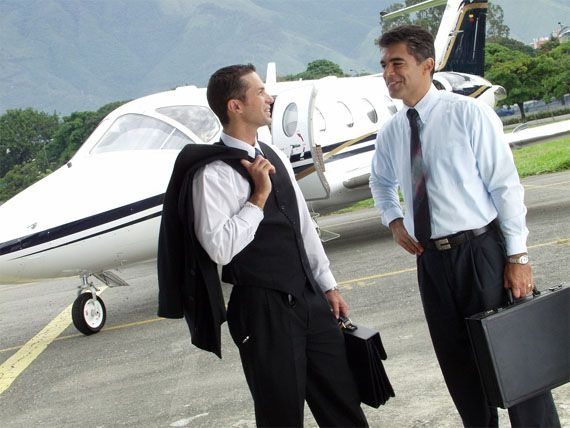
A recent study showed that as much as 95 percent of the nation’s top companies are users of private aviation (NEXA Advisors, Fall 2010). The same study also revealed that companies who use private aviation are able to manage their time, and therefore their businesses, more effectively. They’re able to win over clients from competitors because of the ability to meet face-to-face with their prospects, and retain existing customers due to the ability to quickly respond to their needs. This, in turn translates into increased revenue because of the flexibility and efficiency that private aviation affords its users.
Here are a few of the advantages:
 1) Efficiency: A recent multi-national study found a strong correlation between growth in business travel and growth in economic productivity (Oxford Economics, 2009). It’s estimated that every dollar spent on business travel earns a return of about $12 in increased revenue to the traveler’s employer or company (Oxford Economics, 2009). With less time wasted on travel to and from the airport, security and baggage checkpoints, and connecting flights - in addition to the many other common commercial airline delays - more business is able to be conducted, and conducted more efficiently.
1) Efficiency: A recent multi-national study found a strong correlation between growth in business travel and growth in economic productivity (Oxford Economics, 2009). It’s estimated that every dollar spent on business travel earns a return of about $12 in increased revenue to the traveler’s employer or company (Oxford Economics, 2009). With less time wasted on travel to and from the airport, security and baggage checkpoints, and connecting flights - in addition to the many other common commercial airline delays - more business is able to be conducted, and conducted more efficiently.
Executives are able to visit multiple clients in various states or locations in a single day, which is virtually impossible to do via commercial travel nowadays. They’re also able to do their work on board, as Wi-fi is becoming a "standard" on private aircraft; hold confidential meetings or presentations with associates; and arrive well-rested at private airports that are much closer to and from their final destination. In the U.S. alone, private aircraft users can access over 5,000 airports nationwide, as opposed to approximately only 600 airports that can be accessed by commercial airlines.
 2) Confidentiality: If several members of a company are traveling as a group, all parties on board a private aircraft can speak freely to each other knowing there is virtually no risk of confidential or proprietary information leaking out to the competition. This same type of confidentiality is almost impossible to assure on a commercial flight option.
2) Confidentiality: If several members of a company are traveling as a group, all parties on board a private aircraft can speak freely to each other knowing there is virtually no risk of confidential or proprietary information leaking out to the competition. This same type of confidentiality is almost impossible to assure on a commercial flight option.
3) Personal Safety Features: Unlike on commercial aircraft, executives traveling on private aircraft are acquainted with all parties on board, so they can be assured that there will be little to no chance of terrorist or questionable activities. Also, passengers on private aircraft are usually automatically defaulted to the aircraft general liability insurance policy of the chosen carrier, with the executives having the option to choose which level of ARG/US or Wyvern safety certification (i.e. Gold, Platinum, etc.) they prefer.
 4) No "Loss" of Business: According to a recent study conducted by the Air Transport Association, the total cost to the U.S. economy in 2008 due to commercial airline flight delays was an estimated $18 billion, with a staggering $41 billion loss recorded for 2007. This includes losses to airlines, passengers, and the rest of the U.S. economy. In contrast, a recent study revealed that private aviation users generated more income through productivity and efficiency, outperforming non-users in earnings by 219 percent (NEXA Advisors, Fall 2010). It was also revealed that the average annual earnings growth was 434 percent higher for private aviation users than non-users (Business Jet Traveler, 10/1/10).
4) No "Loss" of Business: According to a recent study conducted by the Air Transport Association, the total cost to the U.S. economy in 2008 due to commercial airline flight delays was an estimated $18 billion, with a staggering $41 billion loss recorded for 2007. This includes losses to airlines, passengers, and the rest of the U.S. economy. In contrast, a recent study revealed that private aviation users generated more income through productivity and efficiency, outperforming non-users in earnings by 219 percent (NEXA Advisors, Fall 2010). It was also revealed that the average annual earnings growth was 434 percent higher for private aviation users than non-users (Business Jet Traveler, 10/1/10).
Clearly, there are no guarantees when it comes to establishing or growing a business. However, when given the opportunity to maximize productivity by eliminating the amount of wasted time waiting in lines, navigating through airport security, and/or flight delays, business executives have a distinct advantage in conducting business more efficiently - and delivering more value and benefit to their clients and shareholders - through the use of private aviation.









